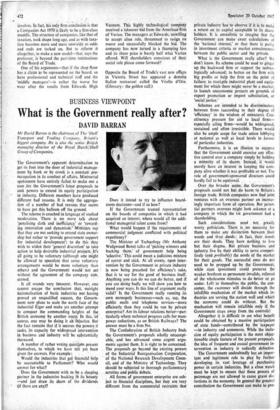What is the Government really after?
BUSINESS VIEWPOINT DAVID BARRAN
Mr David Barran is the chairman of The 'Shell' Transport' and Trading Company. Britain's biggest company. He is also the .senior British managing -director of the Royal Dutch 'Shell Group of Companies.
The Government's apparent determination to get its foot into the door of industrial manage- ment by hook or by crook is a constant pre- occupation in its conduct of affairs. Ministerial spokesmen. have entirely failed: to make out a case, for. the Government's latest proposals to seek powers to extend its equity participation in industry. Different members have produced different bad reasons. It is only the aggrega- tion of a number of bad reasons that seems to have got this balloon off the ground.
The scheme is couched in language of studied moderation. There is no more talk about `penalising sloth and inefficiency.: or `reward- kng innovation and dynamisM." Ministers say that they are not seeking to extend state owner- ship but rather to 'provide government support for industrial development% to do this they Wish to widen their `general discretion' to take action to help desirable industrial projects.:It's all going to be voluntary (although one might be allowed to speculate that some voluntary arrangements would be more voluntary than others) and the Government would not act
Without the agreement of the company con- . cerned.
It all sounds very innocent. However, one cannot escape the conclusion that,' outright nationalisation of basic industries not-: having proved an unqualified success, the Govern- ment now plans to scale the north face of the industrial Eiger and make yet another attempt to conquer the commanding heights .of the , British economy by another route: In this,-of course, one may be doing it aVilijiistice. But the fact remains that if it secures the powers it seeks, its capacity for widespread intervention in business and industry will be substantially increased.
A number of rather vexing questigns present themselves, to which we have n& yet been given the answers. For example:
Would the industries that, got financial help be accountable to Parliament? Who would answer for what?
Does the Government wish to be a sleeping partner in the industries basking ib its bounty —and just draw its share of the dividends (if there are any)? Does it intend to try to influence board- room decisions—and if so how?
If the Government wanted representation on the boards of companies in which it had acquired an interest, where would all the addi- tional managerial talent come from?
What would hapPen if the requirements of commercial judgment conflicted with political expediency?
The Minister of Technology (Mr Anthon! Wedgwood Benn) talks of 'picking winners and backing them,' of ' government help being `selective.' This could mean a judicious mixture of carrot and stick. At all events, open inter- vention by the Government in private industry is now being preached for efficiency's sake, that is to say for the good of business itself. Anything you can do we can do better, and if you are doing badly we will show you how to mend your ways. Is this line of argument really valid? Is the Government really running its own monopoly businesses—such as, say, the• public mails and telephone services—more efficiently than they could be run by private enterprise? Are its labour relations better—par- ticularly where technical progress calls for man; power reductions, as on British Railways? The answer must be a firm No.
The Confederation of British Industry finds the Government's proposals wholly unaccept- able, and has advanced some cogent argu- ments against them. It is right to be concerned. The proposals go beyond the existing powers of the Industrial Reorganisation Corporation, of the National Research Development Coun- cil, and of the Ministry of Technology. They should be subjected to thorough parliamentari scrutiny and public debate.
All forms of government enterprise are sub- ject to financial disciplines, but they are very different from the commercial restraints that private industry has to observe if it is to maki a return on its capital acceptable to its share- holders. It is unrealistic to imagine that the Government can make exact calculations of the 'national interest,' or that there is parity in investment criteria or market consciousness between the public sector and the private.
What is the Government really after? We don't know. Its scheme could be used to ginger up the backward firm or support the techno- logically advanced; to batten on the firm with big profits or help the firm on the point of failure; to stockpile industrial plant and equip- ment for which there might never be a market; to launch uneconomic projects on grounds of export promotion or import substitution, or `social justice.'
Schemes are intended to be discriminatory between firms (according to their degree of `efficiency' in the wisdom of ministers). Con- stituency pressure for aid to local firms— especially ailing firms—would be widespread, sustained and often irresistible. There would also be ample scope for trade union lobbying at national as well as local leVels in favour of particular industries.
Furthermore, it is an illusion to suppose that the Government could exercise any effec- tive control over a company simply bye holding a minority of its shares. Instead, it would merely have an interest in keeping the com- pany alive whether it was profitable or not. The role of government-sponsored directors could hardly fail to beequiyocal.
Over the broader scene, the Government's .
proposals could not but do harm, to Britain's foreign trade. British companies now find' joint ventures with an overseas partner an increas- ingly important form of operation. But potent tial partners overseas might look askance at a company in which the UK government had shareholding.
Such considerations need not, greatly, worry. politicians. There -is no. necessity. Jog them to make any distinction between,. their words and their; deeds: in, fact, their , are their deeds. They. have nothing to lose but their dogma. But private business :and industry. live by their ability, to serve competi- tively (and profitably) the needs- of the market for their goods. The successful ones do not need to be propped up, by the Government, while state ipvestment could preserve gte weaker, brethren as permanent invalids, relieved of the wholesome stimulus to do better or go under. Left to themsehies the public, the 'con- sumer, the customer will decide through the infallible mechanism of the market which in-. dustries are serving the nation well and which the economy could do without. But the mechanisni will remain infallible only if. the Government stays away from the controli!
Altogether it is. difficult to see what benefit could be obtained by a massive participation of state funds—contributed by the taxpayer —in industry and commerce. While the inclu- sion of equity participation is the most objec- tionable single feature of the present proposals, the idea of frequent and casual government in- tervention in industry is radically defective.
The GoVernment undoubtedly has an impor- tant and legitimate role to play by further developing its vast leverage of purchasing power in certain industries. But a close watch must be kept to ensure that these powers of patronage are not allowed to cause grave dis-. tortions in the economy. In general the greatest contribution the Government can make to pro- noting more industrial efficiency is to revive confidence in the economic environment, and to refrain from taxation policies that penalise initiative (whether individual or corporate), and tie up a disproportionate number of people in financial gymnastics who could otherwise be more productively employed.
Rather than trying to infiltrate business equity with public funds, it would be healthier for Britain to develop a larger shareholding democracy. Let the Government leave more of people's money in their own pockets, so that a man can choose for himself where to invest his savings on the basis of what he sees as best for him. Shareholders are not invariably bloated capitalists: many of them have only a small stake in a particular business; and the larger their number grows, the more it will help to dispel some of the emotional hostility that still persists towards profits.
For the rest, the business of government is governing, but the business of business is business. And, as the Duchess in Alice so shrewdly observed: 'If everybody minded their Own business, the world would go round a great deal faster than it does.'



































 Previous page
Previous page